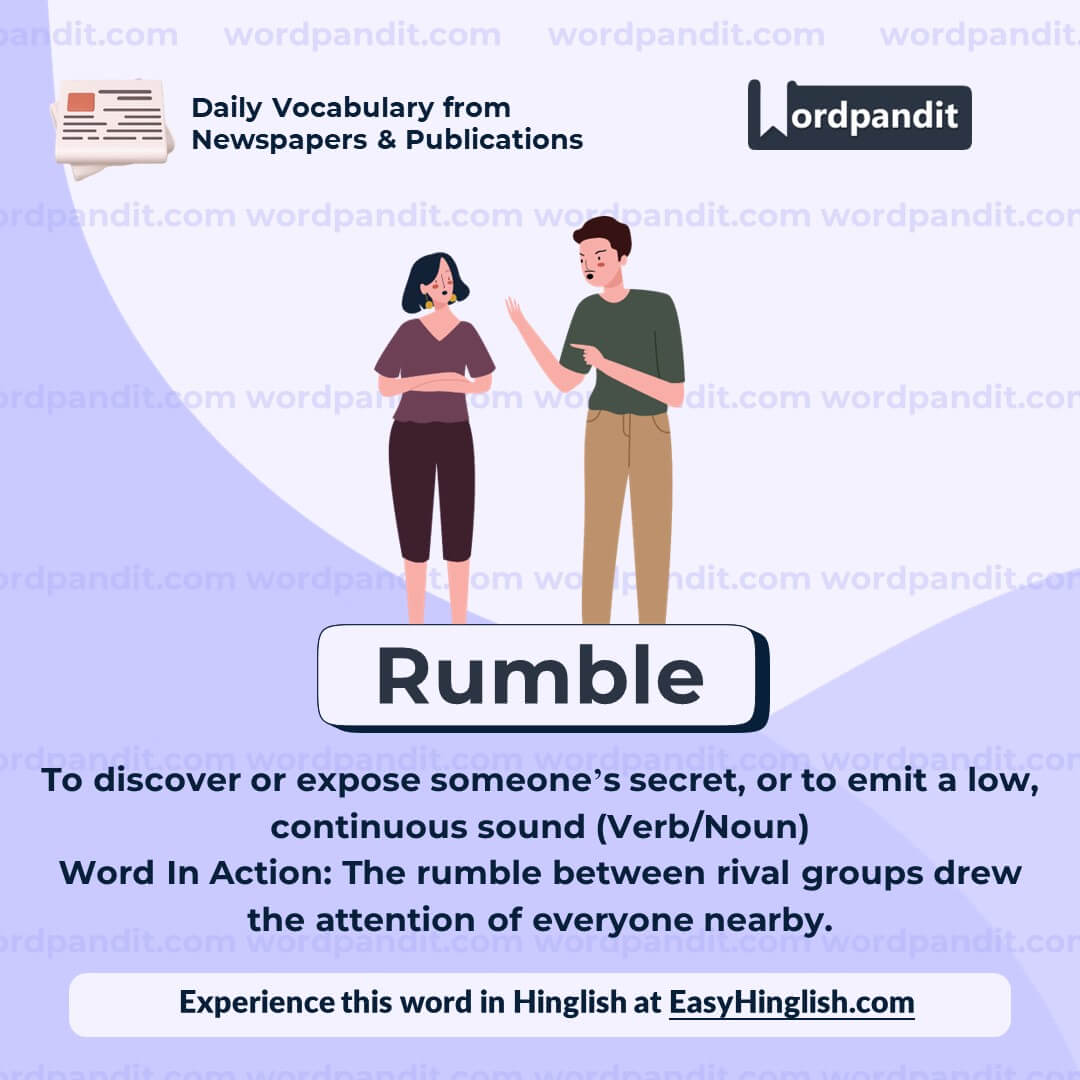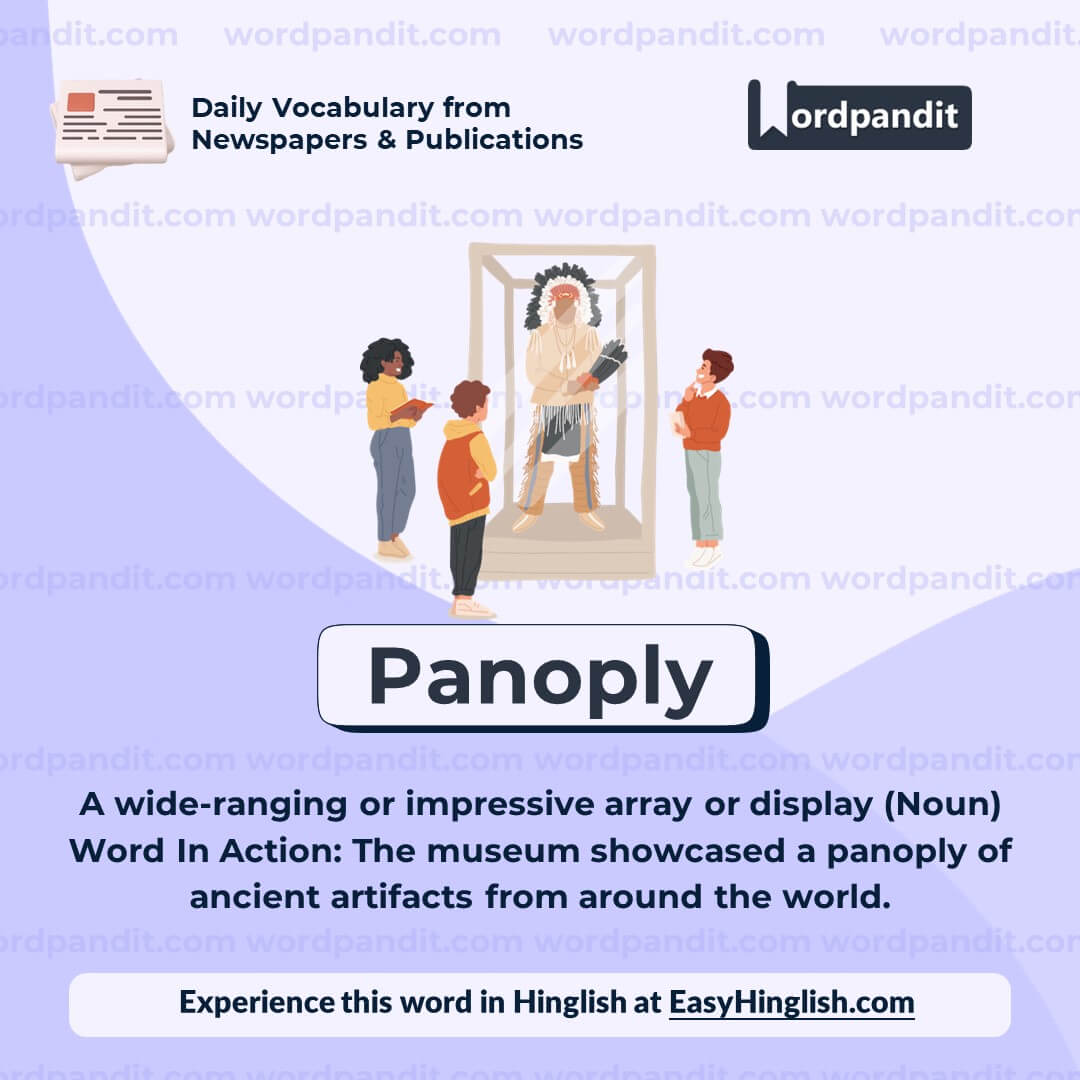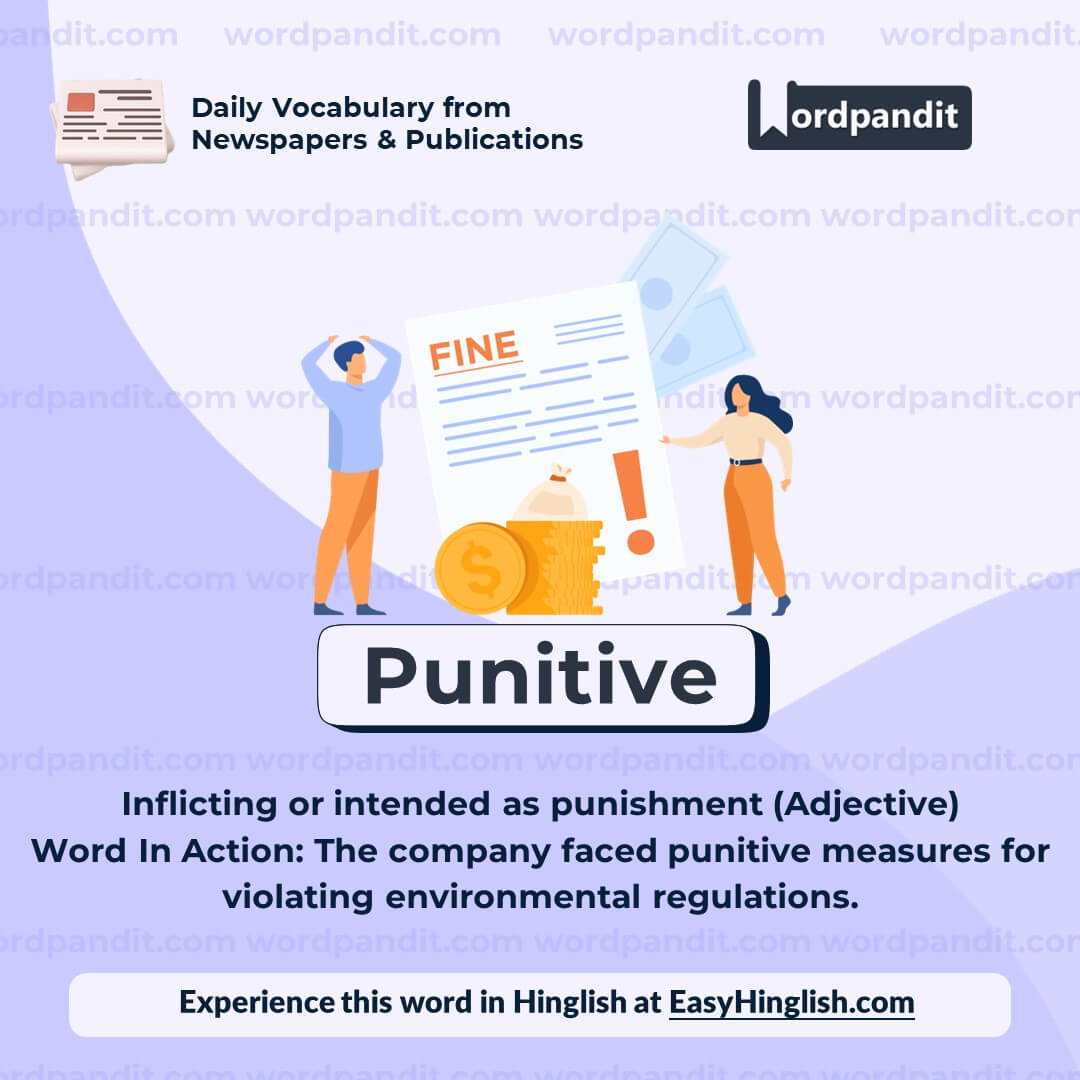Daily Vocabulary from International Newspapers and Publications
Expand Your Vocabulary with Wordpandit’s Global Vocabulary Hub
At Wordpandit, we are committed to helping you develop a truly global vocabulary by drawing from some of the most respected international publications. This section is designed to keep you ahead of the curve by introducing you to words that define global conversations and trends.
The Power of Global Sources
To help you think and communicate on a global scale, we curate vocabulary from renowned international sources, such as:
- The New York Times
- The Washington Post
- BBC
- The Guardian
- The Economist
- Scientific American
- Psychology Today
- And many more...
Stay Global, Stay Competitive
Our daily updates from international publications ensure you are consistently exposed to new words that reflect global news and developments, making sure your vocabulary is not only current but also globally relevant.
Enhance Your Global Perspective
Whether you’re preparing for international exams, aiming to excel in global business communication, or want to enhance your language skills for personal growth, Wordpandit offers the resources you need to thrive in a global context.
Effective Learning, Global Reach
Our learning methodology combines global examples, memory aids, and interactive activities, allowing you to internalize new words effectively and apply them in real-world scenarios.
Begin Your Global Vocabulary Journey Now!
Why Choose Wordpandit?
Practical Learning: Focus on words you'll actually encounter in real-world reading, enhancing your comprehension and communication skills.
Diverse Content: From current affairs to scientific breakthroughs, our varied sources expose you to vocabulary across multiple domains.
Effortless Integration: Make Wordpandit a part of your daily routine. Just a few minutes each day can significantly boost your lexicon over time.
Your Path to Vocabulary Mastery
- Visit our Daily Vocabulary section regularly
- Explore new words and their usage in context
- Practice incorporating these words into your own writing and speech
- Track your progress as your vocabulary expands
Start Your Journey Today
Embark on your vocabulary enhancement journey with Wordpandit. By consistently engaging with our daily posts, you'll build a robust vocabulary that serves you well in academic, professional, and personal contexts.
Remember, a word a day keeps linguistic limitations at bay. Make Wordpandit your daily companion in the quest for vocabulary excellence!
WORD-1: Tyrannical
Context:
"Meanwhile, the tyrannical one-man band in my head kept on going. I was determined the panel should see none of it. But then I found myself blinking madly and caught the head of department eyeing me. I was rumbled." - Aeon
Explanatory Paragraph:
The word "tyrannical" refers to a way of ruling or behaving that is oppressive, harsh, and authoritarian. It is often used to describe leaders, systems, or behaviors that exert control through fear or cruelty, disregarding the opinions and welfare of others.
Meaning: Exercising power in a cruel, oppressive, and arbitrary way (Adjective)
Pronunciation: tih-RAN-ih-kuhl
Difficulty Level: ⭐⭐⭐ Intermediate
Etymology: Derived from the Latin word "tyrannicus," meaning "of or pertaining to a tyrant," which comes from the Greek word "tyrannos," meaning "absolute ruler."
Synonyms & Antonyms:
Synonyms: Oppressive, dictatorial, despotic, authoritarian
Antonyms: Fair, democratic, lenient, compassionate
Usage Examples:
- The tyrannical regime suppressed all forms of dissent with severe punishments.
- Her tyrannical attitude made it difficult for the team to work collaboratively.
- The students protested against the tyrannical rules imposed by the administration.
- Even in small groups, tyrannical behavior can destroy trust and morale.
Cultural Reference:
"The tyrannical rule of King Louis XVI in France was one of the triggers of the French Revolution, as his excessive control and disregard for the people’s suffering led to widespread rebellion." - Historical Context
Think About It:
Can a person exhibit tyrannical behavior without being in a position of official authority? How might this affect relationships?
Quick Activity:
Think of a story or film you’ve seen recently. Identify a character who displayed tyrannical traits and describe their behavior and its impact on others.
Memory Tip:
Remember "tyrannical" by associating it with "tyrant"—both involve harsh and oppressive control.
Real-World Application:
The term "tyrannical" can describe not only oppressive governments but also workplaces, relationships, or any context where one party wields excessive and unfair power over others.
WORD-2: Rumble
Context:
"Meanwhile, the tyrannical one-man band in my head kept on going. I was determined the panel should see none of it. But then I found myself blinking madly and caught the head of department eyeing me. I was rumbled." - Aeon
Explanatory Paragraph:
The word "rumble" has several meanings depending on the context. In this sentence, "rumble" is used informally to mean "discovered" or "found out," often implying that someone's secret has been uncovered. The term can also refer to a low, continuous noise or a fight.
Meaning: To discover or expose someone’s secret, or to emit a low, continuous sound (Verb/Noun)
Pronunciation: RUHM-buhl
Difficulty Level: ⭐⭐ Beginner
Etymology: Originating from Middle English "rumblen," meaning "to make a deep, resonant sound," likely imitative in nature.
Synonyms & Antonyms:
Synonyms: Expose, uncover, detect, hum, growl
Antonyms: Conceal, suppress, silence
Usage Examples:
- The thieves’ plan was rumbled by the alert security guard.
- The distant rumble of thunder signaled an approaching storm.
- The student felt embarrassed when his secret was rumbled by his classmates.
- The rumble of the subway could be felt in the building above.
Cultural Reference:
"Rumble" is also used in pop culture to describe a street fight, famously appearing in the title of the song "Rumble" by Link Wray, a defining track in rock and roll history.
Think About It:
Why do you think the informal meaning of "rumble" as "being found out" evolved from its original meaning of making a deep sound?
Quick Activity:
Write a short dialogue where one character says, "I’ve been rumbled!" What might they have been hiding?
Memory Tip:
Remember "rumble" as "being caught" by imagining the noise of someone sneaking around, eventually giving themselves away.
Real-World Application:
The informal use of "rumble" can be useful when talking about being caught in casual conversations, while its traditional meanings apply in describing sounds or physical confrontations.
WORD-3: Panoply
Context:
"My obsessive-compulsive disorder (OCD) has manifested in a panoply of painful and punitive habits. Scraping my tongue over my teeth, performing complex eye movements, peeling the skin off my lips until they bleed." - Aeon
Explanatory Paragraph:
The word "panoply" refers to an impressive or extensive collection or array of something. It conveys the idea of variety, often emphasizing a full or lavish display. It can also historically refer to a complete set of armor.
Meaning: A wide-ranging or impressive array or display (Noun)
Pronunciation: PAN-uh-plee
Difficulty Level: ⭐⭐⭐ Intermediate
Etymology: From the Greek word "panoplia," meaning "a full suit of armor," derived from "pan" (all) and "hopla" (arms or armor).
Synonyms & Antonyms:
Synonyms: Array, collection, assortment, range
Antonyms: Lack, scarcity, singularity
Usage Examples:
- The museum's exhibit showcased a panoply of ancient artifacts from various cultures.
- She wore a panoply of colors that made her stand out at the event.
- The festival featured a panoply of performances, from music and dance to theater.
- His bookshelf held a panoply of genres, reflecting his diverse taste in literature.
Cultural Reference:
Historically, a "panoply" referred to the full suit of armor worn by Greek or Roman soldiers, symbolizing preparedness and grandeur. This imagery often inspires its metaphorical use in modern language.
Think About It:
How does describing a collection as a "panoply" change the way we perceive it compared to simpler words like "set" or "array"?
Quick Activity:
List three contexts in which you might use the word "panoply," such as a type of event, a collection, or an experience.
Memory Tip:
Link "panoply" to the phrase "panorama of plenty" to remember it describes a wide-ranging and impressive display.
Real-World Application:
"Panoply" is a useful word to describe diverse or impressive collections, whether in art, nature, or experiences. It adds a sense of grandeur to the description.
WORD-4: Punitive
Context:
"My obsessive-compulsive disorder (OCD) has manifested in a panoply of painful and punitive habits. Scraping my tongue over my teeth, performing complex eye movements, peeling the skin off my lips until they bleed." - Aeon
Explanatory Paragraph:
The word "punitive" refers to actions intended as punishment or actions that are harsh and severe in response to a perceived wrongdoing. It is often used to describe measures, policies, or behaviors that are excessively strict or penal in nature.
Meaning: Inflicting or intended as punishment (Adjective)
Pronunciation: PYOO-nih-tiv
Difficulty Level: ⭐⭐⭐ Intermediate
Etymology: From the Latin word "punitivus," derived from "punire," meaning "to punish."
Synonyms & Antonyms:
Synonyms: Disciplinary, penal, retributive, corrective
Antonyms: Lenient, forgiving, permissive, rehabilitative
Usage Examples:
- The company faced punitive fines for violating environmental regulations.
- His punitive approach to parenting often led to resentment among his children.
- The government's punitive measures aimed to deter tax evasion but were criticized as excessive.
- She subjected herself to punitive exercise routines in an attempt to achieve perfection.
Cultural Reference:
The term "punitive damages" is a legal concept referring to financial compensation awarded in lawsuits as a punishment to the defendant for particularly egregious behavior.
Think About It:
Is punishment always necessary for correcting behavior, or are there more effective alternatives to punitive measures?
Quick Activity:
Think of a scenario where a punitive approach was used. How might a more lenient or rehabilitative approach have worked instead?
Memory Tip:
Link "punitive" to "punish"—both words come from the same root and relate to inflicting penalties.
Real-World Application:
"Punitive" is commonly used in legal, academic, and everyday contexts to discuss punishments, fines, or actions taken in response to misconduct or errors.
WORD-5: Itinerant
Context:
"This makes them the itinerant ‘travel writers’ of the rock world, returning to tell us about the restless, animate, hidden nature of the solid Earth." - Aeon
Explanatory Paragraph:
The word "itinerant" describes someone who travels from place to place, often for work or other purposes. It is commonly used to refer to individuals who do not stay in one location for long, emphasizing a lifestyle of frequent movement.
Meaning: Traveling from place to place, especially for work (Adjective/Noun)
Pronunciation: eye-TIN-uh-ruhnt
Difficulty Level: ⭐⭐⭐ Intermediate
Etymology: From the Latin word "itinerantem," meaning "to travel," derived from "iter," meaning "journey."
Synonyms & Antonyms:
Synonyms: Nomadic, wandering, roving, peripatetic
Antonyms: Settled, stationary, rooted, resident
Usage Examples:
- He spent years as an itinerant journalist, reporting from different parts of the world.
- The itinerant musician entertained audiences in cities and towns across the country.
- Many itinerant workers travel seasonally to harvest crops or take on temporary jobs.
- Her itinerant lifestyle made it difficult to maintain long-term relationships.
Cultural Reference:
The term "itinerant" often describes figures in literature, such as traveling poets or bards in ancient cultures, who moved from place to place sharing stories, songs, and news.
Think About It:
What are the benefits and challenges of living an itinerant lifestyle in today’s world?
Quick Activity:
Imagine you are an itinerant traveler. Write a short paragraph about one place you would visit and why.
Memory Tip:
Link "itinerant" to "itinerary," as both involve journeys and movement from one place to another.
Real-World Application:
"Itinerant" is a useful term for describing professions or lifestyles that involve constant travel, such as consultants, performers, or digital nomads.


















